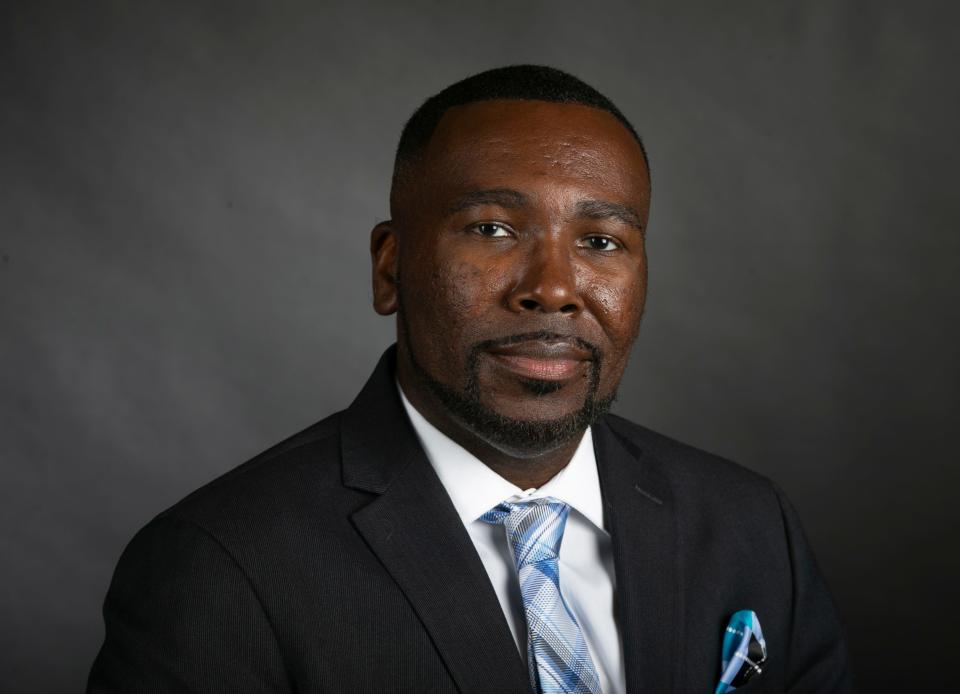Opinion: City must have zero-tolerance policy for slurs

Good riddance. And I'm not just talking about Cincinnati Police Officer Rose Valentino. I'm also referring to Administrative Regulation 25, a city policy that allows employees to use racial, homophobic and other slurs multiple times before they can be fired. This dinosaur of a bad policy needs to hit the bricks as quickly as Valentino.
Valentino was caught on body camera using a slur while driving near Western Hills University High School in April. According to an internal investigation, Valentino said, "F***ing n*****s, I f***ing hate them!" after a male student walking by her cruiser gave her the middle finger. She was fired Monday for using the hateful speech.
What's more disturbing than Valentino's use of the N-word is the mere possibility she could remain on the force. She could challenge her termination, and the Fraternal Order of Police has already said it would defend her. The city of Cincinnati sorely needs a "zero-tolerance" policy when it comes to using prejudicial slurs, because what's currently on the books is extremely weak. Thankfully, it appears such a policy change is in the works.
Cincinnati Councilman Scotty Johnson has proposed a zero-tolerance policy, which he said is long overdue. Though the exact language has yet to be finalized, Johnson hopes to have the legislation in front of City Council by the end of September.
"We have to make sure that we are making the statement crystal clear that it is unacceptable to use a racial slur while on the job, and it will not be tolerated," Johnson said. "You don't have anything to worry about if you don't use them. And if you can't go 8, 10 or 14 hours without doing that, then you need to go find somewhere else to work."
It really should be that simple. Except it's not.
Cincinnati's police department has a discipline matrix. Different types of infractions are counted differently. Officers typically have to break a policy multiple times in order to lose their jobs.
Johnson, a Cincinnati police officer for 33 years and former president of the Sentinels Police Association, acknowledged that the biggest stumbling block to any change in policy would be the the police union and arbitration. "Terminating employees and keeping them terminated," he said.
Any policy change would likely be challenged legally by the Fraternal Order of Police and affected officers. And language in the current police contract, which is in effect for at least a couple more years, probably offers enough disciplinary protections to officers to blunt the effectiveness Johnson and others hope to achieve. But some things are worth fighting for, he said. And I agree.
There's been much talk in the past few years about the so-called culture of corruption at City Hall. Meanwhile, a "culture of racism," which is just as toxic and pervasive, has been largely ignored. A source inside City Hall told me that employees using slurs on the job isn't exclusive to the police department. Employees in other departments have or are facing cases for using slurs while on the job, this source said (stay tuned for more reporting on this).
Slurs have no place in a professional work environment − period. It doesn't matter whether you are Black, white, Hispanic or another race, ethnicity or sexual orientation. Aside from creating a hostile workplace, such behavior by public employees disrespects the very people who pay their salaries. No Black Cincinnati resident pays their hard-earned money in taxes to be called the N-word by some cop.
Even more than that actions like Valentino's threaten to derail all of the great progress Cincinnati has made over the years with police-community relations. It only takes one incident to unravel the work of the Collaborative Agreement, and careless and disrespectful language and racists slurs from officers further erodes trust in police among African Americans.
Her remarks, caught on camera when she thought no one could hear, are concerning because she’s not a random, frustrated motorist. She’s a police officer who carries a gun and might find herself in a situation where she needs to make a split-second decision to use lethal force. The hate she exhibited (and stated) toward people who are Black simply cannot be overlooked when someone is in a position of authority. If Valentino couldn't control her emotions when a kid flips her off at a crosswalk, how can any Black person reasonably trust that she wouldn't escalate a traffic stop or other more tense encounter? The answer is, we can't.
And that is why no one should simply dismiss such hate speech as a "mistake," "faux pas," or mere "slip of the tongue." Slurs are rarely used by mistake, but rather with hurtful and demeaning intent. They create a more dangerous environment for everyone - including other officers. To say it's no big deal and that these are just words, doesn't give the proper respect to the power and impact of our words. Words usually lead to action, and reckless language too often results in destructive behaviors (See recent attempted attack of Cincinnati FBI office). Using a racial slur would have been inappropriate even in a private moment, but on the job, even inside a police cruiser, it should be a terminable offense.
A zero-tolerance policy for slurs would be a good step in the right direction if properly written. But even more important for the city is developing effective processes and evaluations that, at best, help to weed out bad apples before they are even hired, or, at worst, exposes toxic mindsets and tendencies before they become destructive and costly to the city. In truth, that may be easier said than done, but something to aspire to nonetheless.
Valentino's track record of bad behavior should have been a red flag. She told investigators that she did not have any racial biases and does not use racial slurs. Except she did. On camera. And as effortlessly as the slur seemed to come from her mouth, Valentino is asking a lot for us to believe it was her first time using the N-word.
According to the investigative report, Valentino said she has since sought treatment. I'm glad. I hope she is able to reconcile in her heart and mind whatever made her use such hurtful language and rehabilitate her reputation. And I don't rejoice in anyone losing their job and all of the negative consequences that come with a firing. But that doesn't mean she deserves to wear a badge anymore, especially in Cincinnati. Not when so many have worked so hard to move our city past shameful incidents like this.
Valentino wouldn't be the first city employee to use a racial slur and keep her job if she goes to arbitration and wins. But if that happens, City Council should do everything in its power to make sure she is the last. By banning racial slurs, Cincinnati would be one of the few police departments in the country to do so. Let's continue to show the nation why Cincinnati is a model for police-community relations.
Opinion and Engagement Editor Kevin S. Aldridge can be reached at kaldridge@enquirer.com. Twitter: @kevaldrid.

This article originally appeared on Cincinnati Enquirer: Opinion: Cincinnati must have zero-tolerance policy for slurs

